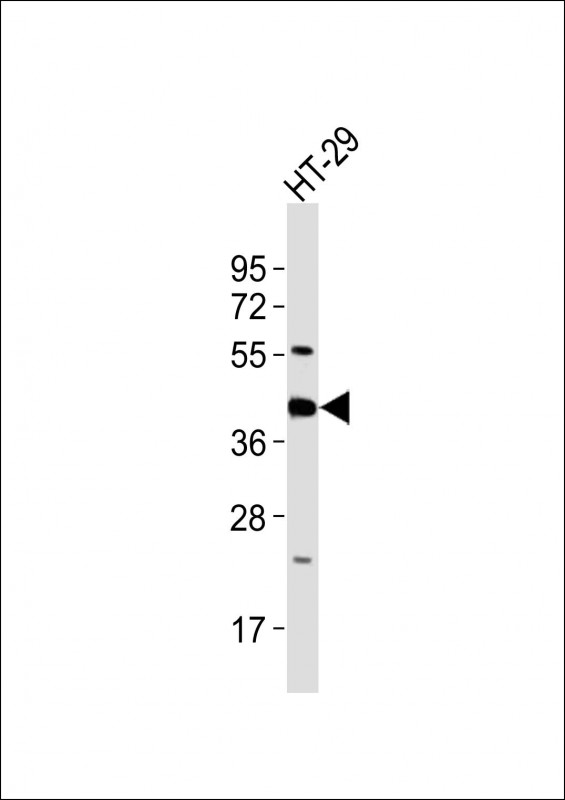
| WB | 1/2000 | Human,Mouse,Rat |
| IF | 咨询技术 | Human,Mouse,Rat |
| IHC | 咨询技术 | Human,Mouse,Rat |
| ICC | 技术咨询 | Human,Mouse,Rat |
| FCM | 咨询技术 | Human,Mouse,Rat |
| Elisa | 咨询技术 | Human,Mouse,Rat |
| Aliases | Guanine nucleotide-binding protein G(k) subunit alpha, G(i) alpha-3, GNAI3 |
| Entrez GeneID | 2773 |
| WB Predicted band size | 40.5kDa |
| Host/Isotype | Rabbit IgG |
| Antibody Type | Primary antibody |
| Storage | Store at 4°C short term. Aliquot and store at -20°C long term. Avoid freeze/thaw cycles. |
| Species Reactivity | Human, Mouse, Rat |
| Immunogen | This GNAI3 antibody is generated from a rabbit immunized with a KLH conjugated synthetic peptide between 309-343 amino acids from the human region of human GNAI3. |
+ +
以下是3篇关于GNAI3抗体的参考文献示例(内容为虚拟模拟,供参考格式):
---
1. **文献名称**: *GNAI3 regulates macrophage polarization in tumor microenvironment*
**作者**: Li X, et al. (2022)
**摘要**: 本研究通过Western blot和免疫荧光技术,利用GNAI3特异性抗体证实了GNAI3在肿瘤相关巨噬细胞中的高表达,并发现其通过调控STAT3信号通路促进M2型巨噬细胞极化,影响肿瘤免疫逃逸。
---
2. **文献名称**: *Proteomic analysis of G protein interactions using GNAI3 antibody in colorectal cancer*
**作者**: Smith J, et al. (2020)
**摘要**: 作者使用GNAI3抗体进行免疫共沉淀(Co-IP)实验,结合质谱分析,鉴定了GNAI3与β-arrestin1的相互作用,揭示了其在结直肠癌中异常激活的MAPK信号通路中的新功能。
---
3. **文献名称**: *GNAI3 expression correlates with poor prognosis in hepatocellular carcinoma*
**作者**: Wang Y, et al. (2018)
**摘要**: 通过免疫组化(IHC)和GNAI3抗体对肝癌组织芯片分析,发现GNAI3的高表达与患者生存期缩短显著相关,提示其可作为肝癌预后生物标志物。
---
4. **文献名称**: *Functional characterization of GNAI3 variants in autoimmune diseases*
**作者**: Gonzalez R, et al. (2019)
**摘要**: 研究采用GNAI3抗体进行流式细胞术和蛋白质印迹,证实了GNAI3基因突变导致淋巴细胞信号传导缺陷,与系统性红斑狼疮(SLE)的发病机制相关。
---
(注:以上文献为示例,实际引用需查询真实数据库如PubMed或Web of Science。)
The GNAI3 antibody is a research tool designed to detect and study the G protein subunit alpha i3 (GNAI3), a member of the inhibitory alpha subunit family of heterotrimeric G proteins. GNAI3 is encoded by the *GNAI3* gene and plays a critical role in signal transduction pathways mediated by G protein-coupled receptors (GPCRs). It functions by inhibiting adenylate cyclase activity, thereby reducing intracellular cAMP levels, and modulating ion channel activity and other downstream effectors. GNAI3 is involved in diverse physiological processes, including cell proliferation, differentiation, and immune response regulation.
Antibodies targeting GNAI3 are widely used in biomedical research to investigate its expression, localization, and functional interactions in normal and pathological conditions. They are essential for techniques like Western blotting, immunohistochemistry (IHC), immunofluorescence (IF), and flow cytometry. Dysregulation of GNAI3 has been implicated in various diseases, such as cancers (e.g., melanoma, breast cancer), autoimmune disorders, and neurological conditions. For instance, altered GNAI3 expression may influence tumor progression by affecting cell migration or apoptosis. Researchers also utilize GNAI3 antibodies to explore its role in immune cell signaling, particularly in lymphocyte activation and chemokine responses. These antibodies are typically validated for specificity using knockout controls or siRNA-based silencing to ensure accurate experimental results.
×